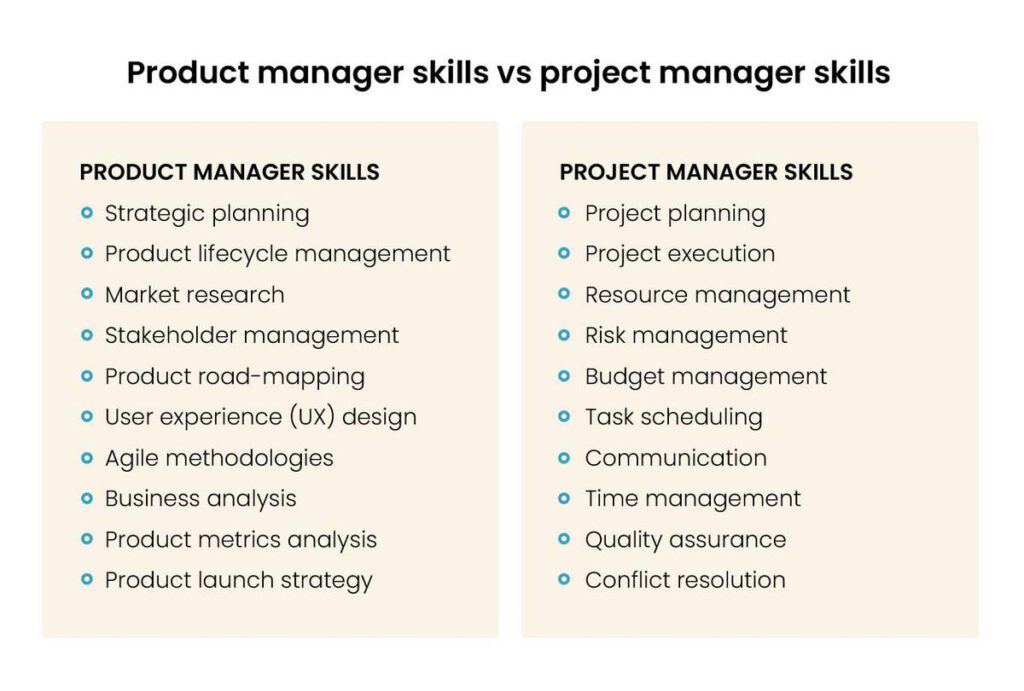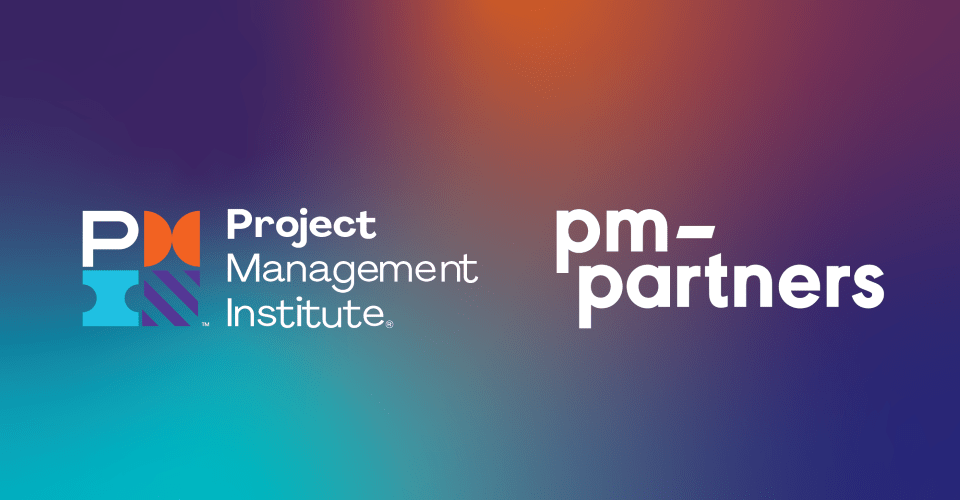Product manager vs project manager: Differences you need to know

When deciding which career path is right for you – product manager vs project manager – it’s important to understand the differences between these two roles and how each professional collaborates with teams. Here we outline what sets them apart.
Depending on your current workplace or the industries you’ve worked in, you may have noticed how some companies use the terms ‘product manager’ and ‘project manager’ interchangeably. But the reality is that both are entirely separate roles, including specific responsibilities, disciplines and skill sets.
Product manager vs project manager: The differences
The main differences between a product manager vs project manager are rooted in what constitutes a product versus a project, as well as the disciplines of product management and project management. While product managers focus on the entire lifecycle of a product, aligning it with the business’s goals and customer needs, project managers are instead in charge of delivering specific projects on time and within budget. Both roles have unique responsibilities, and thus require different skill sets and areas of expertise.
“Project management guides teams to achieve goals within specific limits – for example, time, cost or scope – while product management focuses on achieving outcomes with ongoing product development,” says Irene Liakos, Product Management Consultant and PM-Partners Training Facilitator.
She adds that there are some clear distinctions between the two that can help you understand how a product manager’s role differs from a project manager’s. This can be seen in the following table:

What does a product manager do?
Product managers play a multifaceted role throughout the product management lifecycle, spearheading initiatives from the earliest development phase right through to product decline. They define the product’s vision and roadmap, collaborate with cross-functional teams and prioritise features based on the needs of their target market.
During the introduction phase, product managers oversee product launches and marketing campaigns. Then in the growth stage they tend to focus on increasing customer engagement and market share. As the product matures, they work to improve their existing strategies for profitability and sustainability.
There are also different types of product managers, such as technical product managers and digital product managers. These professionals may specialise in specific industries or only work with a particular type of product (e.g. software).
What does a project manager do?
Project managers are responsible for overseeing how a specific project is executed. They are in charge of making sure it’s completed on time, within budget, according to scope and that all stakeholders are managed well.
In agile environments, project managers will handle sprints and manage backlogs. They will also try to foster collaboration among cross-functional teams. Traditional project managers generally use waterfall methodologies, which follow a linear progression of tasks. Hybrid project managers, on the other hand, combine elements of both agile and traditional approaches, adapting their strategies based on the project’s requirements. They coordinate the resources, manage risks, and communicate with stakeholders to ensure project success, regardless of the methodology used.
A word about the product owner
Product owners play a vital role in agile product development methodologies. They are the person who represents the ‘voice’ of both the customer and stakeholders, and they may do everything from managing the product backlog to collaborating closely with development teams.
Unfortunately, knowing how to distinguish between what a product owner is compared to a product manager vs project manager, for example, often leads to confusion. While product managers focus on the strategic direction of a product throughout its lifecycle and project managers oversee the execution of specific projects, the product owner role sits at the intersection of these functions.
In some companies the product manager role encompasses the product owner role, while in others product owners work closely with product managers. They help to translate the product vision into actionable tasks for development teams. They also look at the product backlog to provide clarity on requirements, and work to make sure the team delivers value to the customer.
While product managers have a broader strategic focus and project managers handle the project’s execution, product owners are deeply involved in the day-to-day activities of product development. Essentially, they are there to ‘bridge the gap’ between strategy and execution.
How do product managers and project managers collaborate?
To ensure the successful delivery of products and projects, both types of managers need to learn to work together. Product managers give strategic direction and define the product vision, while project managers execute specific projects within the product roadmap. They may collaborate by aligning their priorities, managing resources together or coordinating their timelines to hit key business objectives.
Good product managers will communicate the product’s requirements and priorities to project managers, who will then translate them into actionable project plans. A successful partnership is one that is aligned between product strategy and project execution – so all outcomes can be delivered to meet both the customer’s needs and the business’s goals.
Becoming a product manager vs project manager
Whether you become a product manager vs project manager will involve separate career paths and will require different skill sets. The bottom line is that product managers are all about the strategic direction and lifecycle of a product, whereas project managers handle the execution of specific projects within defined constraints.
Each role has its own nuances, so it’s helpful to be aware of the various skills that aspiring professionals require in order to forge a career in either product management or project management.
Product manager skills vs project manager skills
 Product manager vs project manager certifications
Product manager vs project manager certifications
Whether you are looking for a new challenge or want to switch careers, upskilling yourself and getting certified in product management or project management can provide a huge boost to your career prospects.
PM-Partners’ Product Management course will see you become an ICAgile Certified Professional in Product Management (ICP-PDM), while we also offer the Certificate IV in Project Management and Agile Project Management (AgilePM®).
Career paths for product managers vs project managers
Product managers can start out in entry-level positions before moving into senior roles, such as Senior Product Manager or Director of Product Management. They may then move up to the C-suite, with roles including but not limited to Chief Product Officer, which oversees product strategy at the executive level.
Project managers, on the other hand, typically advance from Project Coordinator or assistant roles to Project Manager, then to Senior Project Manager or Program Manager. Further progression may lead to roles like Portfolio Manager or Director of Project Management, which is a position that oversees multiple projects and programs simultaneously.
Product manager salary
The amount you earn will depend on your level of experience and whether you are just starting out or changing careers (e.g. from project management or BA). Where you are located around the country will also influence the salary.
The average salary for a product manager in Australia is anywhere from $110,000 to $130,000 annually. Some industries do have a higher-than-average pay packet, particularly information and communication technology, and insurance and superannuation.
Project manager salary
Because the role of project manager varies so wildly from industry to industry, some salaries may be much more attractive in highly competitive sectors, such as financial services, compared to being a project manager in administration or office support.
The average salary for a project manager in Australia is anywhere from $130,000 to $150,000 annually. However, that can be much higher in the banking sector, or much lower in an administrative role.
Product manager vs. project manager: which role is right for you?
Choosing between a career as a product manager or project manager will depend on everything from your personality traits, existing skills, career ambitions and your level of experience in any particular industry. Product management will more likely suit those who have strong strategic thinking, enjoy market research and are great at stakeholder management. Project management should appeal to those who have exceptional organisation skills, are great time managers and are confident in assessing and managing risk.
For aspiring product managers, read books like Marty Cagan’s Inspired and Melissa Perri’s Escaping the Build Trap, check out blogs like Irene Liakos’s The Product Venn and take our Product Management course to get valuable guidance and pursue this exciting career.
Now that you know the major differences between a product manager vs project manager, you can start to make decisions around where you want your career to lead. Whether you are considering a pivot into a new industry or simply want to enhance your skills, our Product Management course will deliver the training you need to master this exciting role and forge a long and successful career as a product manager.
Call our professional development team on 1300 13 14 to find out more about the product manager or project manage role. Or, if you’re already decided, jump online and book into our Product Management course or a range of project management courses. It’s time to unlock your true potential and make a lasting impact in the world of products and projects.








